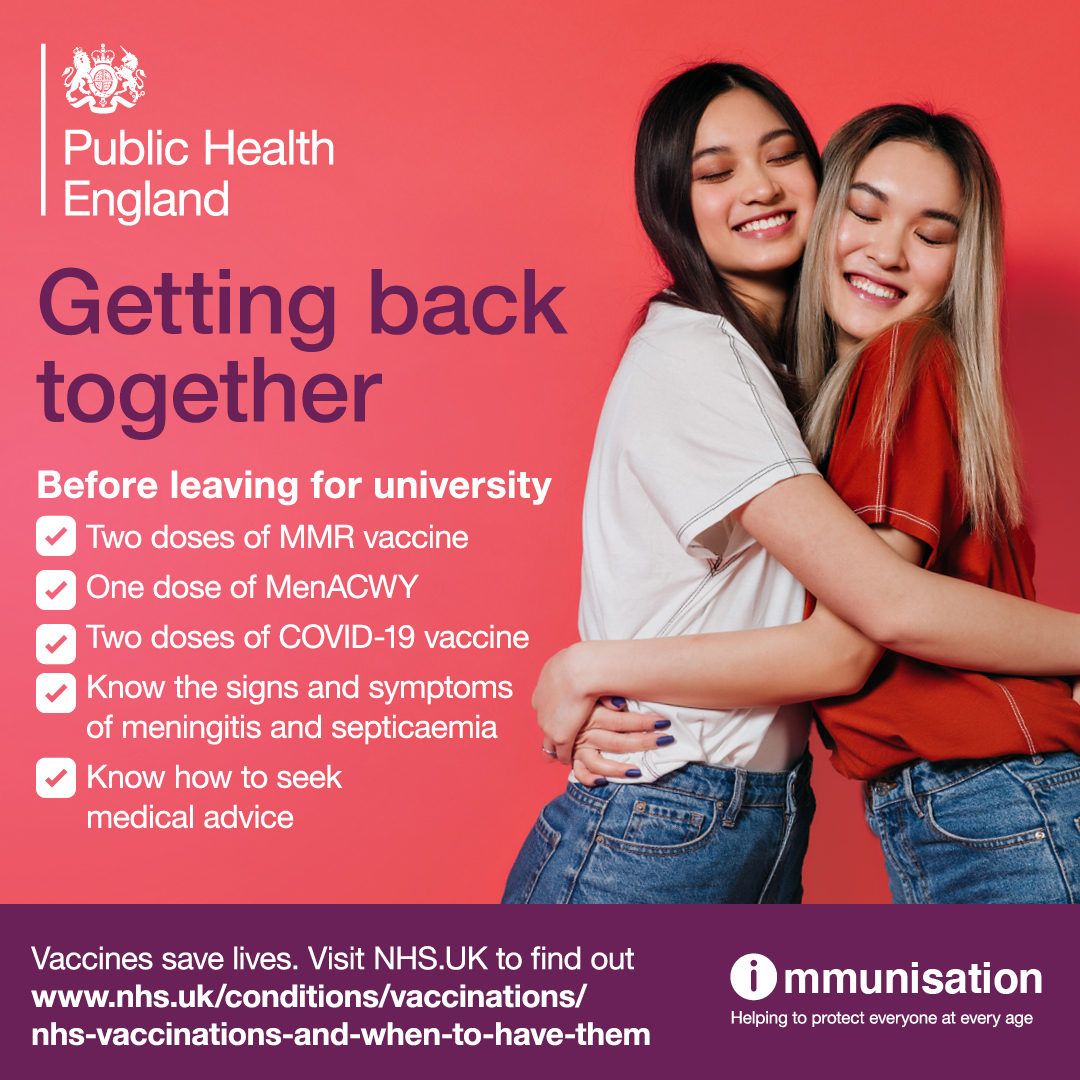Student Support - Health
-
Vaccination
We want to help you stay fit and well during your time here. All students who have not already done so should make sure they are up to date with vaccinations.
- Meningococcal disease causes meningitis and/or septicaemia (blood poisoning) and can be very severe. If you are under 25 years of age and have not yet had the MenACWY vaccine please ask your GP practice about this. It protects against 4 main forms of meningococcal disease but not all, so still know signs and symptoms.
- Don’t let measles or mumps ruin your time at university. You can help to protect yourself and stop the spread by checking with your GP that you have had 2 doses of the MMR vaccine.
- Make sure you know the main signs and symptoms of meningococcal disease (meningitis and/or septicaemia) and how to get help or advice if you or one of your friends feels very unwell, especially if you are getting worse. For more information see Meningitis Now and Meningitis Research Foundation.”
Measles
Measles is very infectious, it can cause serious complications and, in rare cases, can be fatal. Measles can be more severe in young people and adults, often leading to hospital admissions.
Measles starts with cold-like symptoms and sore red eyes followed by a high temperature and a red-brown blotchy rash. If you experience these symptoms, call NHS 111.
The best way to protect yourself against measles is have 2 doses of the MMR vaccine. It is never too late to get the vaccine. There are no risks to your health if you get an extra dose.
Young people are strongly advised to check if they had the MMR vaccine. They can check if they have had 2 doses of the vaccine with your GP and arrange a catch up now if necessary.
If a students suspects they have measles they should stay away from others for at least 4 days after the rash has appeared.
Students should call NHS 111 if they think they might have measles or have been in contact with someone who has had it.
Mumps
Mumps is a contagious viral infection. It can be painful and in rare cases can lead to the swelling of the ovaries, swelling of testes, meningitis and deafness.
Mumps is recognised by the painful swellings at the side of the face under the ears. However more general symptoms often develop a few days before the face swells. These can include:
• earache
• joint pain
• feeling sick
• dry mouth
• mild abdominal pain
• feeling tired
• loss of appetite
• a high temperature (fever) of 38°C (100.4°F), or above
The best way to protect yourself against mumps is have 2 doses of the MMR vaccine. It is never too late to get the vaccine. There are no risks to your health if you get an extra dose.
Anyone with symptoms should stay away from others and stay at home and not return to university until 5 days after the swelling started.
Young people are strongly advised to check if they had the MMR vaccine. Check if you have had 2 doses of the vaccine with your GP and arrange a catch up NOW if necessary.
Call NHS 111 if you think you might have mumps or have been in contact with someone who has had it.
Meningococcal disease
Meningitis and septicaemia can develop suddenly and can kill or leave people with life changing disabilities and health problems.
Meningococcal disease can be difficult to diagnose because it has been associated with other symptoms, such as severe diarrhoea and vomiting.
Symptoms of meningitis and septicaemia include: fever, aching muscles and joints, a stiff neck, severe headache and/or a blotchy rash that doesn’t fade when a glass is rolled over it.
Know the main signs and symptoms of meningococcal disease (meningitis and/or septicaemia) see Meningitis Now and Meningitis Research Foundation.
Symptoms vary and can occur in any order. The MenACWY vaccine is available free to any student who has not already had the vaccine up until their 25th birthday.This includes any student born overseas. The vaccine protects against 4 common causes of meningococcal disease – MenA, MenC, MenW and MenY but not other forms, like MenB.
Higher Education students, particularly freshers, are known to be at increased risk of meningococcal meningitis and septicaemia. Being in confined environments with close contact, such as university halls, hostels when travelling, or attending festivals, increase the chances of infection if unprotected.
If you suspect meningitis or septicaemia getting immediate medical treatment can be life-saving. Dial 999 without delay in a medical emergency.
COVID-19
COVID-19 signs and symptoms often include a sore throat, cough, fever and/or loss of taste and smell but other symptoms such as diarrhoea, vomiting and cold-like symptoms can occur.
Students need to know how to seek medical advice if they become concerned about their own or someone else’s health and to do this as early as possible.
Early testing can help students be informed and stop them passing on the infection to other people. Tests may still be available free of charge to students with certain health conditions.
For long term protection, it is really important that students aged 18 years and older have 2 doses of COVID-19 vaccine at least 8 weeks apart and a booster dose 3 months after their last dose.
Wherever students remain eligible before arriving at university it is better to have all their doses before leaving home. This means they will be better protected when they arrive.
If they have not yet had a dose that they have been called for or should have been called for they should follow this up with their GP practice, call 119 or attend a walk-in or pop-up clinic.

